关于中美经贸摩擦的事实与中方立场
新华网 2018-09-25 10:36

四、美国政府的贸易霸凌主义行为
IV. The trade bullyism practices of the US administration
美国作为二战结束后国际经济秩序和多边贸易体制的主要建立者和参与者,本应带头遵守多边贸易规则,在世界贸易组织框架下通过争端解决机制妥善处理与其他成员国之间的贸易摩擦,这也是美国政府曾经向国际社会作出的明确承诺。但是,美国新政府上任以来,片面强调“美国优先”,奉行单边主义和经济霸权主义,背弃国际承诺,四面出击挑起国际贸易摩擦,不仅损害了中国和其他国家利益,更损害了美国自身国际形象,动摇了全球多边贸易体制根基,最终必将损害美国长远利益。
As the key builder of the international economic order and a major participant in the multilateral trading regime after the Second World War, the US should have taken the lead in observing multilateral trade rules and properly handling trade frictions with other WTO members through the dispute settlement system within the WTO framework. This is what the US government explicitly pledged to the international community. However, since taking office, with a narrow focus on “America First”, the new US administration has practiced unilateralism and economic hegemony, abandoned its international commitments, and provoked international trade friction around the world. This has not only undermined the interests of China and other countries, but also jeopardized the international reputation of the US itself. And above all, it has shaken the foundations of the global multilateral trading regime, which will ultimately hurt the long-term interests of the US.
(一)根据美国国内法单方面挑起贸易摩擦
1. Unilaterally provoking trade friction on the pretext of US domestic law
美国现任政府以产业损害和保护知识产权为由,绕开世界贸易组织争端解决机制,单纯根据美国国内法挑起国际贸易摩擦,以“232条款”、“201条款”和“301条款”名义发起一系列调查。在调查中选择性使用证据材料,得出武断结论,而且未经世界贸易组织授权,非法使用惩罚性高关税对待世界贸易组织成员,严重违反世界贸易组织最基本、最核心的最惠国待遇、关税约束等规则和纪律。这种单边主义行为,不仅损害了中国和其他成员利益,更损害了世界贸易组织及其争端解决机制的权威性,使多边贸易体制和国际贸易秩序面临空前险境。
Citing industrial injuries and protection of intellectual property rights, the current US administration regularly circumvents the WTO’s dispute settlement system and provokes international trade friction merely using US domestic law as a pretext, initiating a host of investigations under the auspices of Section 232, Section 201 and Section 301. These investigations involve selective use of evidence and arbitrary conclusions. Without WTO authorization, the US has illegally imposed punitive, hefty tariffs on other WTO members, which is a serious breach of the most fundamental and central WTO rules and disciplines, including the most-favored-nation treatment and tariff binding. Such unilateralist actions have harmed the interests of China and other WTO members. More importantly, they have undermined the authority of the WTO and its dispute settlement system, and exposed the multilateral trading system and international trade order to unprecedented risks.
对多国产品开展“232调查”。美国政府滥用“国家安全”概念推行贸易保护措施。2017年4月,美国政府依据本国《1962年贸易扩展法》第232条款,以所谓“国家安全”为由对包括中国在内的全球主要经济体的钢铁和铝产品发起“232调查”(注53),并依据单方面调查结果,于2018年3月宣布对进口钢铁和铝分别加征25%和10%的关税,招致各方普遍反对和报复。2018年4月5日,中国率先将美国钢铝232措施诉诸世界贸易组织。美国宣布自6月1日恢复对欧盟钢铝产品加征关税后,欧盟也予以反击并向世界贸易组织申诉,指责美国的措施违反世界贸易组织规则。欧盟贸易专员马姆斯特罗姆称,美国正在进行“危险游戏”,欧盟如不作回应将等同于接受这些非法关税。截至2018年8月,已有9个世界贸易组织成员向世界贸易组织起诉美国钢铝232措施。2018年7月,美国政府又以所谓“国家安全”为由,对进口汽车及零配件发起新的“232调查”。
The US administration has conducted Section 232 investigations against the products of multiple countries, abusing the concept of “national security” for trade protectionism. In April 2017, on the basis of Section 232 of its Trade Expansion Act of 1962, the US administration initiated Section 232 investigations against the steel and aluminum products of China and other major economies, citing “national security” reasons. In March 2018, based on the conclusions of these unilateral investigations, the US announced 25 percent tariffs on steel and 10 percent on aluminum imports, incurring widespread opposition and retaliation. On April 5, 2018, China took the lead to bring the case of US Section 232 measures against steel and aluminum to the WTO. Following the US announcement on the resumption of tariffs against EU steel and aluminum products effective from June 1, the EU struck back and appealed to the WTO, charging the US with violation of WTO rules. European Commissioner for Trade Cecilia Malmström said that the US was playing “a dangerous game”, and the EU would be accepting these illegal tariffs if it did not respond. By August 2018, nine WTO members have litigated at the WTO over the Section 232 measures on steel and aluminum. In July 2018, the US administration initiated another round of Section 232 investigations on imported automobiles and auto parts, again on the grounds of “national security”.
众所周知,钢、铁等属于一般性生产资料,汽车属大众消费品,与“国家安全”建立联系非常牵强。美国彼得森国际经济研究所高级研究员查德·鲍恩认为,美国汽车产能利用率超过了80%,美国约98%的乘用车进口来自欧盟、日本、加拿大、韩国和墨西哥,以汽车危及美国国家安全为由开展调查是站不住脚的(注54)。美国政府随意扩大国家安全概念范围,毫无理论和历史依据,其实质是利用相关法条赋予总统行政权力,绕过常规法律限制实施贸易保护(专栏6)。
It is self-evident that steel and iron are basic raw materials for manufacturing, and automobiles are ordinary consumer goods. It is absurd to link them to “national security”. Chad Bown, senior fellow of the Peterson Institute for International Economics, noted that the capacity utilization rate of the US automobile industry was over 80 percent and about 98 percent of US passenger vehicle imports were from the EU, Japan, Canada, the ROK and Mexico. Therefore, initiating the investigations on the ground that automobile imports impair US national security is baseless. The US administration’s arbitrary expansion of the scope of national security has no theoretical or historical logic. Essentially, it is all about using the executive power of the US President provided for by the relevant sections of certain law to circumvent regular legal restrictions to practice trade protectionism (Box 6).
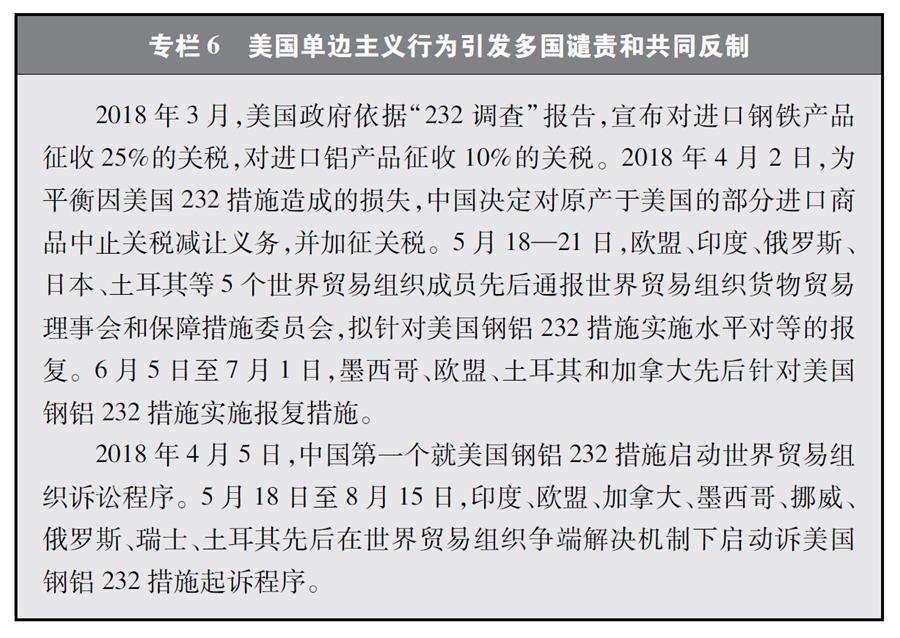
Box 6 Unilateral actions by the United States have triggered condemnation and countermeasures from multiple countries
In March 2018, pursuant to its Section 232 investigation report, the US administration announced 25 percent tariffs on imports of steel products and 10 percent on aluminum products. On April 2, 2018, in response to the loss caused by the US Section 232 measures, China decided to suspend tariff concessions and impose tariffs on some imports originating in the US. From May 18 to 21, five WTO members – the EU, India, Russia, Japan and Turkey – notified the Council for Trade in Goods and Committee on Safeguards of the WTO about their plans to retaliate in kind on the US measures on steel and aluminum. From June 5 to July 1, Mexico, the EU, Turkey and Canada retaliated against the US Section 232 measures.
On April 5, 2018, China took the lead to initiate a WTO dispute procedure against the US Section 232 measures on steel and aluminum. From May 18 to August 15, India, the EU, Canada, Mexico, Norway, Russia, Switzerland and Turkey initiated dispute procedures over the US Section 232 measures on steel and aluminum under the dispute settlement system of the WTO.
图表:专栏6 美国单边主义行为引发多国谴责和共同反制 新华社发
对多国产品开展“201调查”。2017年5月,美国依据本国《1974年贸易法》,对进口洗衣机和光伏产品发起“201调查”(注55),并在2018年1月决定对前者征收为期3年、税率最高达50%的关税,对后者征收为期4年、税率最高达30%的关税。这是2001年以来美国首次发起“201调查”。作为美国进口洗衣机的主要来源,韩国已于5月向世界贸易组织提起磋商请求,并宣布将中止对美国部分产品的关税减让措施,以回应美国对韩国产品征税的做法。2018年8月14日,中国将美国光伏产品201措施诉诸世界贸易组织争端解决机制。
The US has conducted Section 201 investigations against products of multiple countries. In May 2017, on the basis of its Trade Act of 1974, the US initiated Section 201 investigations on imported washing machines and photovoltaic products. In January 2018, it decided to impose a maximum of 50 percent tariffs for three years on washing machines and a maximum of 30 percent tariffs for four years on photovoltaic products. These were the first Section 201 investigations initiated by the US since 2001. As a major source of washing machines imports to the US, the ROK submitted a request for consultations to the WTO in May and announced that it would suspend tariff concessions on some US products as a response to the US imposition of tariffs on its products. On August 14, 2018, China resorted to the WTO dispute settlement system over the Section 201 measures on photovoltaic products.
对中国开展“301调查”。2017年8月,美国依据本国《1974年贸易法》,对中国发起“301调查”(注56),并在2018年7月和8月分两批对从中国进口的500亿美元商品加征25%关税,此后还不断升级关税措施,2018年9月24日起,又对2000亿中国输美产品征收10%的关税。“301调查”是基于美国国内法相关条款开展的贸易调查,衡量并要求其他国家接受美国的知识产权标准和市场准入要求,否则就采取报复性的贸易制裁手段,早在上世纪90年代就被称为“激进的单边主义”。
The US has initiated Section 301 investigation against China. In August 2017, the US initiated a Section 301 investigation against China based on its Trade Act of 1974. A 25 percent tariff was imposed on US$50 billion worth of goods from China in July and August 2018, followed by a continuation of escalating tariff measures. Another tariff of 10 percent on a further US$200 billion worth of China’s exports to the US was imposed from September 24, 2018. A Section 301 investigation is a trade investigation based on relevant provisions of US domestic law. It requests other countries to accept the intellectual property standards and market access requirements of the US, or face retaliatory trade sanctions. Such practice was described as “aggressive unilateralism” as early as in the 1990s.
从历史数据看,“301调查”使用频率较低且多通过磋商协议解决。根据彼得森国际经济研究所2018年3月发布的研究报告(注57),1974年至今,美国共进行122起“301调查”,但自2001年起,只有一起“301调查”被正式启动。美国政府曾于1994年做出一项“行政行动声明”,表示要按照符合世界贸易组织规则的方式来执行“301条款”,即美国只有在获得世界贸易组织争端解决机制授权后才能实施“301条款”所规定的制裁措施。1998年,当时的欧共体向世界贸易组织提出关于“301条款”的争端解决案。世界贸易组织争端解决机构认为,单从其法律规定上看,可以初步认定“301条款”不符合世界贸易组织规定。在本次中美经贸摩擦中,美国政府动用“301条款”对中国开展调查,在未经世界贸易组织授权的情况下对中国产品大规模加征关税,明显违反美国政府的上述承诺,其行为是完全非法的。
Historical data show that it is very rare for a Section 301 investigation to be initiated – most cases are settled through consultation. According to a report from the Peterson Institute for International Economics released in March 2018, from 1974 to the present, the US government has conducted 122 such Section 301 investigations, but there has been only one new Section 301 investigation since 2001. In 1994, the US government issued a “Statement of Administrative Action”, stating that the Administration intends to use Section 301 under the WTO rules, and that it would only impose sanctions under Section 301 with authorization from the WTO Dispute Settlement Body (DSB). In 1998, the European Communities filed a case to the WTO DSB against Section 301, and the Panel came to a preliminary finding that in respect of the statutory language, Section 301 is inconsistent with WTO rules. The US government has initiated a Section 301 investigation in the course of its current trade frictions with China, and imposed huge tariffs on Chinese goods in the absence of WTO authorization. These actions have clearly violated its afore-mentioned commitments, and are completely illegal.
(二)片面指责他国实施产业政策
2. Baseless accusations against other countries’ industrial policies
产业政策是一种弥补市场失灵、改善社会福利的有效工具,只要符合世界贸易组织确定的规则,不应受到无端指责。
As an effective tool to remedy market failures and improve social welfare, industrial policies should not be subject to groundless accusations as long as they are consistent with WTO rules.
美国是世界上较早运用产业政策的国家之一。尽管美国很少承认实行产业政策,但事实上美国政府实施了比官方说法多得多的产业政策(注58)。这些产业政策的范畴从推进技术创新到政府采购、对特定部门和企业的补贴,以及关税保护、贸易协定等,为增强美国产业竞争力发挥了重要作用。
The US was among the first to adopt industrial policies. The US rarely acknowledges the adoption of such policies, but its government has in fact undertaken many more industrial policies than the official narrative allows. Ranging from technological innovation incentives and government procurement, through subsidies on specific sectors and companies, to tariff protection and trade agreements, these industrial policies have played a vital role in enhancing the competitive strength of US industries.
美国为强化制造业在全球的领导者地位,近年来研究制定了一大批产业政策。进入新世纪后,特别是国际金融危机爆发后的近十年来,美国出台了一系列产业政策,其中包括《重振美国制造业框架》(注59)(2009)、《美国制造业促进法案》(注60)(2010)、《先进制造业伙伴计划》(注61)(2011)、《美国制造业复兴——促进增长的4大目标》(注62)(2011)、《先进制造业国家战略计划》(注63)(2012)、《美国创新战略》(注64)(2011)、《美国制造业创新网络:初步设计》(注65)(2013)等等,针对重点领域研究制定了《电网现代化计划》(2011)、《美国清洁能源制造计划》(注66)(2013)、《从互联网到机器人——美国机器人路线图》(注67)(2013)、《金属增材制造(3D打印)技术标准路线图》(注68)(2013)、《美国人工智能研究与发展战略计划》(注69)(2016)、《美国机器智能国家战略》(注70)(2018)等。这些政策提出要调整优化政府投资,加大对制造业投资的力度;加强政府对商品的采购;为出口企业提供信贷支持,拓展国际市场;资助制造业重点领域创新等具体措施。
To strengthen its global leadership in manufacturing, the US has in recent years formulated a large number of industrial policies. In the 21st century, and in particular over the decade since the outbreak of the international financial crisis, the US has introduced a number of industrial policies including A Framework for Revitalizing American Manufacturing (2009), the United States Manufacturing Enhancement Act of 2010, the Advanced Manufacturing Partnership (2011), A Manufacturing Renaissance: Four Goals for Economic Growth (2011), A National Strategic Plan for Advanced Manufacturing (2012), A Strategy for American Innovation (2011) and the National Network of Manufacturing Innovation: A Preliminary Design (2013). Such plans are also made for key areas such as the Grid Modernization Initiative (2011), the Clean Energy Manufacturing Initiative (2013), A Roadmap for U.S. Robotics – From Internet to Robotics (2013), the Measurement Science Roadmap for Metal-Based Additive Manufacturing (2013), the National Artificial Intelligence Research and Development Strategic Plan (2016) and A National Machine Intelligence Strategy for the United States (2018). These policies include, among others, specific measures to adjust and improve government investment to scale up input in manufacturing, to increase government procurement of certain products, to provide credit support to export companies to expand global market, and to fund innovation in key areas of manufacturing.
美国在制定推行产业政策的同时,却对他国正常的产业政策横加责难。联合国贸易和发展会议发布的《世界投资报告2018》指出,为应对新工业革命的机遇与挑战,在过去十年中,发达国家和发展中国家至少有101个经济体(占全球GDP的90%以上)出台了正式的产业发展战略。《中国制造2025》也是在这样的背景下,借鉴了美国的《先进制造业国家战略计划》、《美国创新战略》等政策文件,结合中国实际制定出台的。《中国制造2025》是一个引导性、愿景性的文件,也是一个坚持市场主导、开放包容的发展规划。中国政府一直强调《中国制造2025》是一个开放的体系,对内资外资具有普遍适用性。中国领导人在多个场合表示,欢迎外国企业参与《中国制造2025》。2017年发布的《国务院关于扩大对外开放积极利用外资若干措施的通知》明确提出,外商投资企业和内资企业同等适用于《中国制造2025》政策。文件制定过程中,中国严格遵循世界贸易组织规定,确保相关政策合规透明、公平无歧视。《中国制造2025》实施以来,包括美国企业在内的许多外国企业均已参与到相关的建设项目中来。
While formulating and promoting its own industrial policies, the US has made unwarranted accusations against other countries’ justified industrial policies. The UNCTAD World Investment Report 2018 pointed out that responding to the opportunities and challenges associated with a new industrial revolution, at least 101 economies across the developed and developing world (accounting for more than 90 percent of global GDP) have adopted formal industrial development strategies over the past 10 years. It was against this backdrop, inspired by US policy papers such as A National Strategic Plan for Advanced Manufacturing and A Strategy for American Innovation, and based on its own national conditions, that China formulated its Made in China 2025 program. Made in China 2025 is an introductory paper describing a vision, and a market-centered, open and inclusive blueprint for development. The Chinese government has maintained that Made in China 2025 is an open system that is applicable to both domestic and foreign investment. Chinese leaders have stated on several occasions that China welcomes foreign companies to participate in Made in China 2025. China’s State Council released a notice in 2017 on measures to expand opening up and actively utilize foreign investment, which made clear that Made in China 2025 policies apply equally to foreign-invested companies and Chinese companies. The paper was formulated in strict accordance with WTO rules to ensure the relevant policies are legitimate, transparent, fair and non-discriminatory in nature. Many foreign enterprises, including US companies, have participated in programs under Made in China 2025 since its implementation.
(三)以国内法“长臂管辖”制裁他国
3. “Long-arm jurisdiction” and sanctions against other countries based on US domestic laws
“长臂管辖”是指依托国内法规的触角延伸到境外,管辖境外实体的做法。近年来,美国不断扩充“长臂管辖”的范围,涵盖了民事侵权、金融投资、反垄断、出口管制、网络安全等众多领域,并在国际事务中动辄要求其他国家的实体或个人必须服从美国国内法,否则随时可能遭到美国的民事、刑事、贸易等制裁。
“Long-arm jurisdiction” refers to the practice of extending one’s tentacles beyond one’s borders and exercising jurisdiction over foreign entities based on one’s domestic laws. In recent years, the US has been extending its “long-arm jurisdiction” to wider areas including civil torts, financial investment, anti-monopoly, export control and cybersecurity. In international affairs, the US has frequently requested entities or individuals of other countries to obey US domestic laws, otherwise they may face US civil, criminal or trade sanctions at any time.
以出口管制为例,美国为巩固技术领先优势,很早就构建起一揽子出口管制制度。主要依据《出口管理法》、《出口管制条例》、《国际紧急经济权力法》,要求美国出口商或用户出口时必须申请许可证。对于国外购买方而言,则要求不得违反商品最终用途、最终用户等限制性规定,否则将受到处罚,包括被列入“实体清单”,严格限制或禁止从美国进口。统计显示,截至2018年8月1日,全球范围内被列入美国商务部“实体清单”的主体数量达到1013家。这种行为不仅损害了包括美国公司在内的相关企业利益,还损害了广大发展中国家发展权利。
Take export control as an example. To consolidate its technological advantages, the US has long established an all-round export control system. Through the Export Control Act, the Export Administration Regulations and the International Emergency Economic Powers Act, US exporters or exporting users must apply for export licenses. Foreign buyers are required not to violate restrictive regulations such as those on end-use and end-users, otherwise they will be subject to penalties, including being put in the Entity List which will place them under strict restrictions, or even prohibit them from importing from the US. Statistics show that by August 1, 2018, as many as 1,013 entities from around the world have been put on the Entity List of the US Department of Commerce. This action has undermined not only the interests of companies concerned – including those from the US – but also the development rights of developing countries.
美国还在抓紧审查修订现行出口管制法规,强化“长臂管辖”行为。2018年8月13日,美国总统签署了《2019财年国防授权法案》,作为其重要组成部分的《出口管制改革法案》提高了对外国控股公司的限制条件,增加了对“新兴和基础技术”的出口控制,建立了跨部门协商机制以提高执法能力。近期,美国商务部产业和安全局以“违反美国国家安全或外交政策利益”为由,将44个中国机构新列入出口管制名单。这种行为给中国企业参与相关贸易制造了障碍,实质是对“长臂管辖”强化和升级。
The US is also vigorously reviewing and revising its export control legislation to strengthen its “long-arm jurisdiction”. On August 13, 2018, the US President signed the National Defense Authorization Act 2019, an important part of which is the Export Control Reform Act (ECRA). The ECRA further tightened restrictions on foreign-holding companies, intensified controls on “emerging and basic technologies”, and mandated an inter-agency process to boost law enforcement capabilities. Recently, the Bureau of Industry and Security of the US Department of Commerce added 44 Chinese entities to its Entity List for “acting contrary to the national security or foreign policy interests of the United States”. Such measures create obstacles for Chinese businesses to conduct normal trade and are in fact an extension and upgrading of “long-arm jurisdiction”.
(四)将国内问题国际化、经贸问题政治化
4. Internationalizing domestic issues and politicizing economic and trade issues
现任美国政府基于国内政治需要,将国内问题国际化、经贸问题政治化,通过指责他国转嫁国内矛盾。
The current US administration, in response to domestic political issues, is choosing to internationalize domestic issues and politicize economic and trade issues, and blaming other countries for its own problems.
美国将国内政策失误和制度缺陷导致的失业问题错误归因于国际贸易。美国政府认为他国通过不公平贸易的方式抢夺了本国就业岗位,作为美国贸易逆差最大来源国,中国首当其冲成为主要的被指责对象。事实是,根据联合国数据,2001-2017年,中美贸易额增长了4.4倍,但美国失业率则从5.7%下降到4.1%。尤其是2009年以来,美国从中国进口快速增长,同期美国失业率反而呈现出持续下降的态势,美国政府指责的货物进口和失业率之间的替代关系并不存在(图12)。2017年美国国会研究中心报告显示,2010-2015年,尽管美国制造业从中国进口整体增加32.4%,美国制造业的工作机会反而增加了6.8%(注71)。
It has erroneously attributed unemployment caused by domestic policy and institutional flaws to international trade. The US administration has accused other countries of “stealing US jobs through unfair trade”. China, as the biggest source of the US trade deficit, is a convenient primary target. However, statistics from the United Nations show that between 2001 and 2017, China-US trade expanded by a factor of 4.4, and yet unemployment in the US dropped from 5.7 percent to 4.1 percent. In particular, while US imports from China surged from 2009 onward, unemployment in the US saw a steady decline during the same period. The causal relationship between imports of goods and job losses, as claimed by the US administration, does not exist (see Chart 12). A report from the US Congressional Research Service in 2017 reveals that between 2010 and 2015, the number of US manufacturing jobs rose by 6.8 percent even though US imports from China in that sector increased by 32.4 percent.
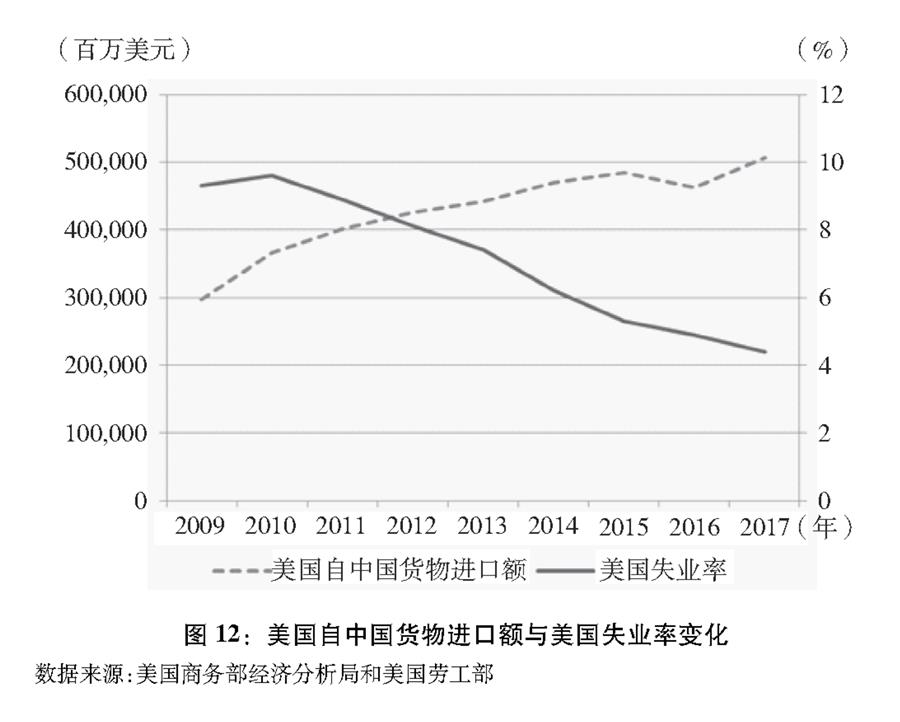
事实上,美国部分社会群体失业问题,主要是技术进步和经济结构调整背景下,国内经济政策失误和再分配、再就业机制缺失引起的。根据美国印第安纳州波尔州立大学的研究,2000-2010年期间,美国制造业工作机会减少560万个,88%是由于生产率提高导致的(注72)。在市场经济条件下,一切要素都在流动变化之中,没有永远不变的工作岗位。随着美国比较优势变化,不同行业就业情况出现差异,传统制造业等行业出现就业岗位减少,这本是经济发展和结构调整的正常现象。美国政府本应顺应经济结构调整大趋势,采取积极有效的再分配和再就业支持措施,帮助失业人员转移到新兴行业就业。但是,受制于传统的分配机制和利益格局,美国政府没有及时建立合理的再分配和再就业支持机制,导致部分社会群体的失业问题长期积累、积重难返,为政治上的民粹主义和孤立主义提供了土壤。
In fact, unemployment of some social groups in the US is caused by flaws in domestic economic policy and the absence of proper redistribution and reemployment mechanisms against the backdrop of technological advances and economic restructuring. A study by Ball State University in the State of Indiana finds out that almost 88 percent of the 5.6 million jobs lost in manufacturing in the US between 2000 and 2010 can be attributed to productivity growth. In a market economy where all production factors are in flux, no job lasts forever. The evolution of comparative advantages of the US has had different impacts on job creation in different industries. Decrease of jobs in some industries such as traditional manufacturing is a normal phenomenon in the course of economic development and structural adjustment. The US government should have adapted to the overall trend of economic structural adjustment, taking proactive and effective measures to improve redistribution and reemployment and to help the unemployed find jobs in emerging industries. However, constrained by its traditional distribution mechanism and vested interests, the US government has failed to establish appropriate redistribution and reemployment mechanisms in time. The result has been the build-up of long-standing unemployment among some social groups. This has provided the breeding ground for political populism and isolationism.
现任美国政府把失业问题归咎于国际贸易和出口国不符合事实,是在国内政治矛盾难以解决的情况下试图向外转嫁矛盾。美国如不真正解决自身的深层次结构性问题,而是通过贸易保护措施引导制造业回流,这种本末倒置、以邻为壑、逆经济规律而动的行为,只会降低全球经济效率,引发世界各国反对,损人而不利己。
The current US administration’s attempt to blame international trade and exporting countries for domestic unemployment is not supported by facts; it aims to deflect public attention in the face of intractable domestic political problems. Without truly resolving its own deep-seated structural problems, the US attempt to bring the manufacturing sector back home through protectionist measures is a completely counter-productive move. This beggar-thy-neighbor and lose-lose approach runs counter to economic rules and will only make the world economy less efficient and trigger opposition from countries around the globe. The US will do as much damage to itself as it will to others.
(五)现任美国政府背信弃义
5. The current US administration is violating its own commitments
规则意识和契约精神是市场经济和现代国际秩序的基础。遵守规则、尊重契约使得不同个人、群体和国家可以形成广泛合作,是人类进入文明社会的主要特征。现任美国政府不顾各国公认、普遍遵循的国际交往准则,采取了一系列背信弃义的做法,对国际关系采取机会主义态度,引发国际社会广泛质疑和批评。美国这些急功近利的短视做法,损害了美国的国际信誉,将动摇美国国际地位和战略利益。
Respect for rules and contract has been the foundation of the market economy and the international order since the advent of modern times. It makes cooperation between different individuals, groups and countries possible, which is a defining feature of civilized human society. The current US administration has turned its back on universally-recognized and widely-observed norms governing international relations, and made a series of moves in violation of its own commitments. The opportunism of the US toward international relations has been widely challenged and criticized by the international community. The short-sighted actions of the US in pursuit of short-term interests harm its international credibility, and will undermine its international standing and prejudice its strategic interests.
美国政府藐视国际协定的权威性,扰乱全球治理秩序。以国家名义做出的承诺和签署的协定不受政府换届干扰,保持一贯性,是一国保持国际信誉的基础。现任美国政府夸大多边体制问题和国家之间的分歧,不愿承担维护国际秩序成本,对国际规则约束进行选择性遵守,接连退出联合国教科文组织、人权理事会等多个国际组织,退出了上届美国政府力推达成的跨太平洋伙伴关系协定和巴黎气候协定,强制要求重谈北美自由贸易协定和美韩自贸协定。
The US administration shows no respect for the sanctity of international agreements and disrupts global governance order. A country should uphold the commitments and agreements it has entered into regardless of government succession. This is essential for a country’s credibility. Exaggerating problems in the multilateral system and differences between countries, the current US administration, unwilling to bear the cost of upholding the international order, has taken a selective approach to international rules. It has withdrawn from international organizations such as UNESCO and the UNHRC, pulled out from the TPP and the Paris Agreement that the previous US administration worked so hard to conclude, and is demanding renegotiation of the North American Free Trade Agreement (NAFTA) and US-Korea Free Trade Agreement.
以联合国、世界银行、国际货币基金组织和关贸总协定为起点,经过不断完善,形成了今天的全球政治经济治理体系。世界贸易组织是当前重要的多边经贸机制,在国际经贸合作中发挥着关键作用,在世界上受到普遍尊重和认同,目前成员已超过160个。但是,美国经常违反世界贸易组织规则,1995-2015年期间,因美国未执行世界贸易组织争端解决机制裁定而被胜诉方提出暂停申请、中止对美国关税减让义务的案件数量占到世界贸易组织同类案件总数量的2/3(注73)。
The global political and economic governance system has only become what it is through constant improvements, starting from the inception of the United Nations (UN), the World Bank, the International Monetary Fund (IMF) and the General Agreement on Tariffs and Trade (GATT). The WTO is an important multilateral trading regime with a total of over 160 members. It is essential to global trade cooperation, and is widely respected and recognized in the world. However, the US frequently violates WTO rules. The number of cases where members requested a suspension of the application of tariff concessions, or suspended tariff concession obligations to the US due to the latter’s failure to comply with the rulings of the DSB, accounted for two thirds of all such cases between 1995 and 2015.
这一系列行为,是对国际契约的违背,是对经贸伙伴的不尊重,更是对美国国家信誉的损害。世界经济论坛发布的《2018年全球风险报告》指出,美国对多边主义秩序造成的侵害,以及美国阻挠世界贸易组织上诉机构新法官任命,将加剧2018年的全球风险。
These actions of the US violate international contracts and disrespect its trading partners, and what is more, undermine its credibility as a country. The “Global Risks Report 2018” released by the World Economic Forum pointed out that global risks will intensify in 2018, as the US erodes multilateralism and blocks appointments to the WTO’s appellate body.
美国政府破坏市场机制,直接干预商业行为。现任美国政府屡屡突破政府边界,对市场主体实施直接干预。例如,不顾商业规律,要求苹果公司等美国企业海外工厂回迁。此外,美国政府还对美国企业对外投资进行恐吓阻挠。例如,2017年1月3日,警告通用汽车,如果它继续在墨西哥制造雪佛兰科鲁兹型号汽车的话,将需要支付大额关税(注74);2018年7月3日,威胁哈雷公司不得将生产业务转移出美国(注75);通过社交媒体点名批评威胁企业高管,以各种借口加强对正常并购交易的审查等。
The US administration has undermined the market mechanism through direct intervention in business operations. The current US administration has time and again overstepped its purview to directly meddle with market players. For instance, it has demanded that Apple and some other American companies move their overseas factories back to the US, regardless of market rules. The administration has also intimidated and obstructed American companies making investments abroad. For instance, on January 3, 2017, General Motors was threatened with a heavy border tax for continuing to make Chevrolet Cruze models in Mexico. On July 3, 2018, Harley-Davidson was warned not to move part of its operation out of the US. Executives of American companies have been named and shamed on social media, as the administration tightens supervision over normal merger deals under various pretexts.
美国政府在双边经贸谈判中出尔反尔,不守承诺。中国历来高度重视维护中美关系稳定,特别是2017年以来,积极回应美国经贸关切,以极大的诚意和耐心与美国政府开展了多轮磋商,力图弥合分歧、解决问题。2018年2月下旬到3月上旬,应美国方面强烈要求,中国派团赴美举行经贸谈判。4月3日,美国公布对500亿美元中国输美产品加征25%关税的产品清单。面对美国反复无常、不断抬高要价的行为,中国本着最大限度通过对话解决问题的诚意,于5月初与来华谈判的美国代表进行了认真磋商。5月15日至19日,中国应美国要求再次派代表团赴美谈判,并在谈判中对美国诉求做了积极回应。双方在付出艰辛努力后,达成“双方不打贸易战”的共识,并于5月19日对外发表了联合声明。但是,仅仅10天之后,美国政府就公然撕毁双方刚刚达成的联合声明,背弃不打贸易战的承诺,越过世界贸易组织争端解决机制,宣布将对来自中国的产品实施大规模征税措施,单方面挑起贸易战(专栏7)。
The US administration has repeatedly backtracked and reneged on its commitments in bilateral trade negotiations. China sets great store by a stable China-US relationship. It has actively responded to the trade concerns of the US, especially since 2017. Multiple rounds of talks have been conducted with the US administration with utmost sincerity and patience, in an effort to narrow differences and solve problems. In response to a strong request from the US, China sent a delegation to the US for trade talks between late February and early March 2018. Yet on April 3, the US announced a 25 percent tariff on a list of Chinese exports worth US$50 billion. Despite this repeated backtracking and in the face of rising demands from the US, China has demonstrated complete sincerity in seeking a negotiated solution, and sat down for earnest consultations with a visiting US delegation in early May. At the US request, China sent another delegation to the US which actively responded to the US concerns in negotiations between 15 and 19 of May. Thanks to the strenuous efforts of both sides, a consensus was reached “not to fight a trade war”, and a joint statement was released on May 19. However, only 10 days later, the US administration tore up the freshly inked joint statement and broke its promise not to engage in a trade war. It bypassed the dispute settlement system of the WTO to announce massive tariffs on Chinese exports, thus unilaterally starting a new phase of conflict (Box 7).
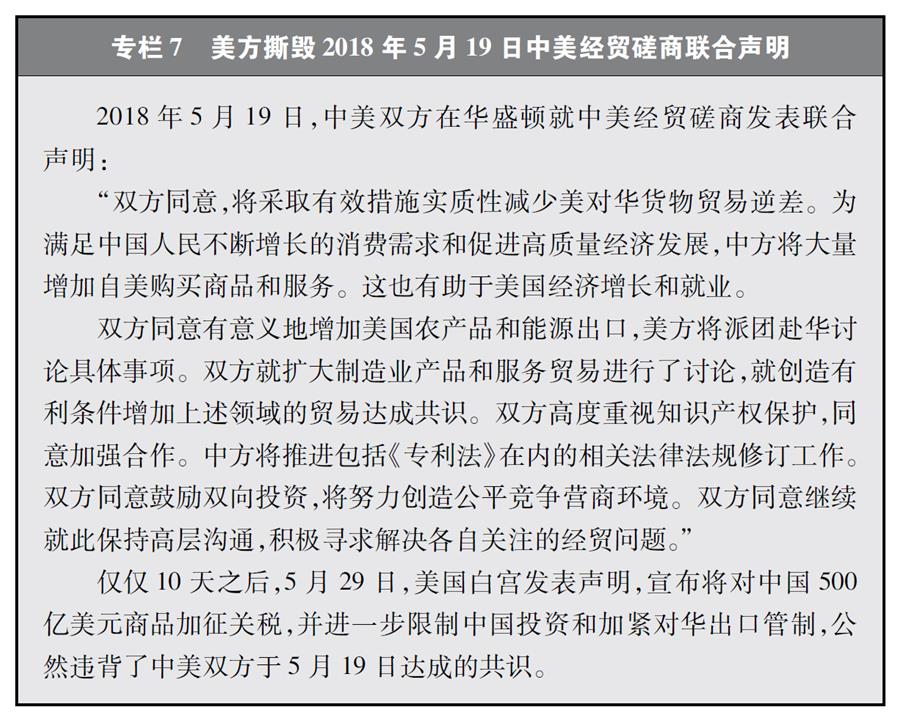
Box 7 The US Tore up the Joint Statement Regarding Trade Consultations Reached with China on May 19, 2018
On May 19, 2018, China and the United States issued a joint statement regarding trade consultations in Washington D.C.
“There was a consensus on taking effective measures to substantially reduce the US’s trade deficit in goods with China. To meet the growing consumption needs of the Chinese people and the need for high-quality economic development, China will significantly increase purchases of US goods and services. This will help support growth and employment in the United States.
Both sides agreed on meaningful increases in US agriculture and energy exports. The United States will send a team to China to work out the details. The delegations also discussed expanding trade in manufactured goods and services. There was consensus on the need to create favorable conditions to increase trade in these areas. Both sides attached paramount importance to intellectual property protection, and agreed to strengthen cooperation. China will advance relevant amendments to its laws and regulations in this area, including the Patent Law. Both sides agreed to encourage two-way investment and to strive to create a fair, level playing field for competition. Both sides agreed to continue to engage at high levels on these issues and to seek to resolve their economic and trade concerns in a proactive manner.”
Yet only 10 days later on May 29, the White House released a statement about imposing tariffs on US$50 billion of imports from China, implementing specific restrictions on Chinese investment in the US, and tightening export controls on China. This is a blatant violation of the consensus the two sides reached on May 19.
图表:专栏7 美方撕毁2018年5月19日中美经贸磋商联合声明 新华社发









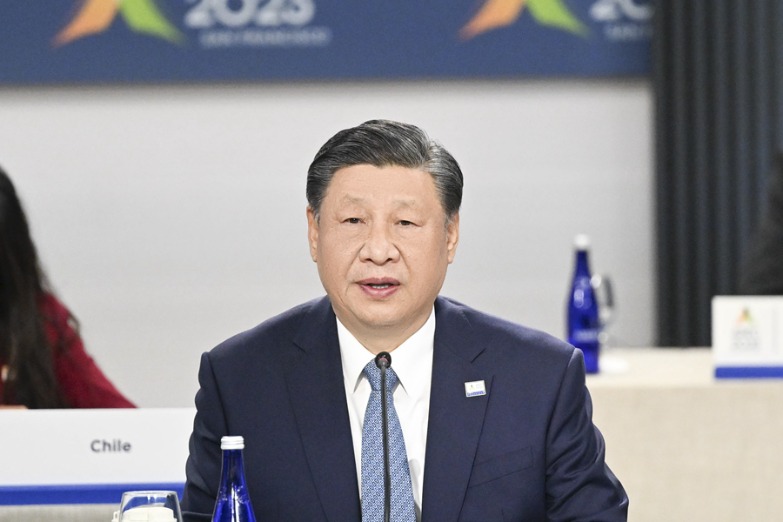
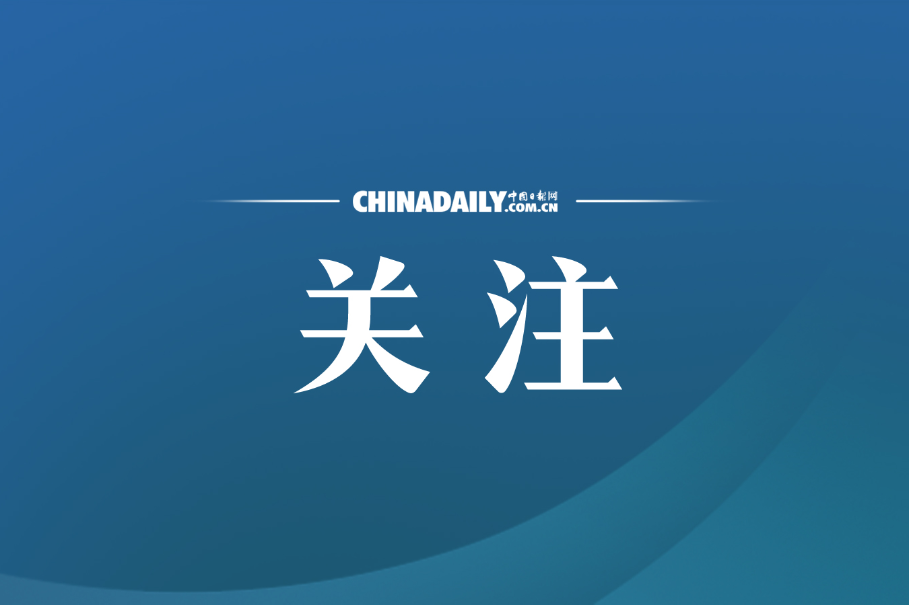
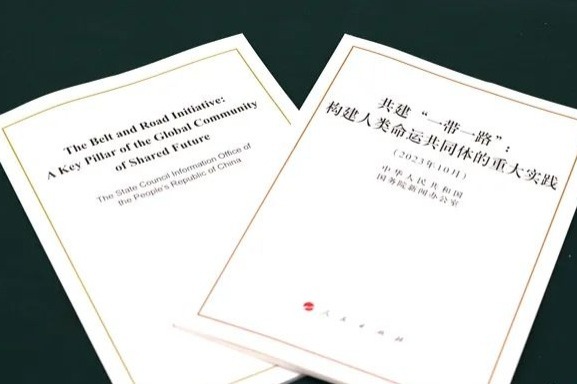
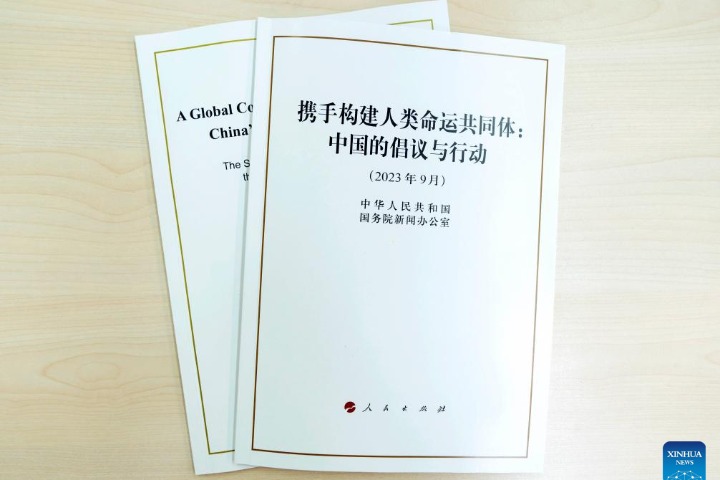
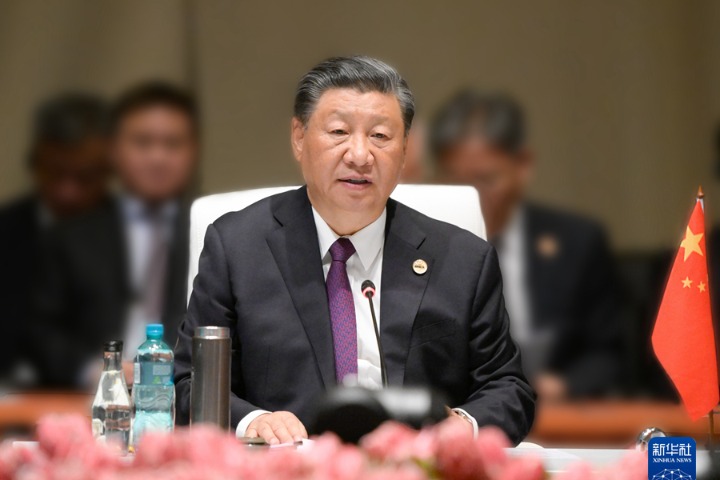



 英语点津微信
英语点津微信 双语小程序
双语小程序